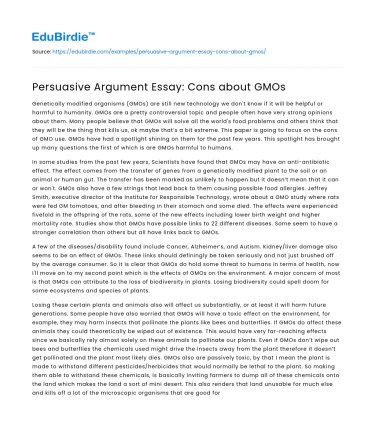Introduction
Genetically modified organisms (GMOs) have become a cornerstone in contemporary agricultural practices, promising increased yield, pest resistance, and nutritional enhancement. However, the proliferation of GMOs has incited significant debate and scrutiny among scientists, environmentalists, and consumers. While advocates highlight their potential to address global food shortages, opponents raise compelling concerns regarding their safety, environmental impact, and ethical implications. This essay critically examines the adverse aspects of GMOs, emphasizing the potential health risks, ecological disturbances, and socio-economic challenges they present. By dissecting these issues, the essay aims to present a balanced perspective on why caution should prevail in the widespread adoption of GMOs. Understanding these risks is crucial for policymakers, scientists, and the public as they navigate the complex landscape of genetic engineering in agriculture.
Health Concerns and Unintended Consequences
One of the primary arguments against GMOs centers around potential health risks. Critics argue that the long-term health implications of consuming genetically modified foods are not fully understood. A study published in the International Journal of Biological Sciences highlighted that rats fed with genetically modified corn exhibited liver and kidney damage, indicating possible health hazards (Séralini et al., 2009). Although the study faced criticism over its methodology, it underscores the necessity for thorough, long-term studies on human health effects. Moreover, the introduction of new allergens is a significant concern. Genetic modifications often involve the transfer of genes from one organism to another, which can introduce allergens that were absent in the original crop. For instance, a gene from the Brazil nut was once inserted into soybeans to improve their protein content but was discontinued after it was found to cause allergic reactions (Nordlee et al., 1996). These cases illustrate the potential for GMOs to introduce unintended health risks, warranting rigorous testing and regulatory oversight.
Save your time!
We can take care of your essay
- Proper editing and formatting
- Free revision, title page, and bibliography
- Flexible prices and money-back guarantee
The precautionary principle suggests that in the absence of conclusive evidence about the safety of GMOs, they should be approached with caution. Proponents of GMOs argue that these modifications undergo strict regulatory scrutiny before approval. However, the rapid pace of technological advancement often outstrips the capacity of regulatory bodies to thoroughly assess each new GMO product. This gap between innovation and regulation can lead to the market release of GMOs without comprehensive understanding of their long-term health impacts. Therefore, adopting a cautious approach is prudent, prioritizing consumer safety and health over commercial interests.
Environmental Impacts and Biodiversity Threats
The ecological ramifications of GMOs are another significant concern. The introduction of genetically modified crops can lead to a reduction in biodiversity. A report by the Union of Concerned Scientists emphasizes that GMOs often promote monoculture practices that could displace diverse plant species, thereby reducing biodiversity (UCS, 2013). Such monocultures are particularly vulnerable to disease and pests, which could lead to agricultural instability. Furthermore, genetically engineered crops designed to be pest-resistant can inadvertently affect non-target species, disrupting local ecosystems. For instance, the widespread use of Bt crops, engineered to produce a toxin against specific insects, has raised concerns about harm to beneficial insects like monarch butterflies (Losey et al., 1999).
Additionally, GMOs contribute to the phenomenon of "superweeds," which are weeds that have developed resistance to common herbicides due to the extensive use of herbicide-tolerant GM crops. This resistance necessitates the use of stronger, more toxic herbicides, exacerbating environmental degradation and impacting soil and water quality. While proponents argue that GMOs can reduce pesticide use and improve yields, the environmental costs suggest a need for more sustainable agricultural practices. Transitioning to such methods would require balancing short-term productivity gains against long-term ecological health.
Socio-Economic Challenges and Ethical Considerations
Beyond health and environmental concerns, GMOs pose socio-economic and ethical challenges. The biotechnology industry, dominated by a few multinational corporations, often exercises significant control over the seed market. This monopolization can marginalize small-scale farmers and erode traditional agricultural practices. Farmers who adopt GMOs often enter into restrictive agreements that limit their ability to save and replant seeds, increasing their dependence on biotech companies for annual seed purchases. Such practices can exacerbate economic disparities, particularly in developing regions where smallholder farmers are most vulnerable.
Ethically, the manipulation of genetic materials raises questions about the moral implications of altering natural organisms. Critics argue that GMOs represent a form of "playing God," with unforeseen consequences. The ethical debate extends to the labeling of GMO products. Consumer advocacy groups emphasize the right to know what is in their food, advocating for transparent labeling laws. While some argue that GMOs are substantially equivalent to their non-GMO counterparts, the ethical imperative for informed consumer choice remains a contentious issue.
Conclusion
In conclusion, while GMOs offer potential benefits in addressing food security and agricultural efficiency, the associated risks and challenges cannot be overlooked. Health concerns, environmental impacts, and socio-economic issues underscore the need for a cautious and balanced approach to GMO adoption. Rigorous scientific research, robust regulatory frameworks, and ethical considerations must guide the development and deployment of GMOs. As society grapples with the complexities of genetic engineering, it is imperative to prioritize safety, sustainability, and transparency. Future discourse should focus on developing comprehensive strategies that mitigate risks while maximizing the potential benefits of GMOs. This balanced approach will ensure that GMOs contribute positively to global food systems without compromising health, ecological integrity, or social equity.






 Stuck on your essay?
Stuck on your essay?

